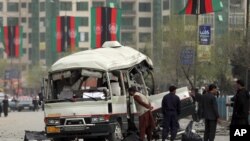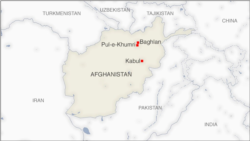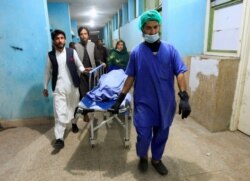A global rights monitor is urging authorities in Afghanistan to launch investigations into recent targeted killings of civilians in prominent positions, and to prosecute those responsible.
The latest incident of targeted attacks on civilians came Tuesday when gunmen ambushed a bus carrying university staff in northeastern Baghlan province, killing the driver and a student. Officials said the attack injured six university lecturers. The Taliban insurgent group denied involvement and instead condemned the bus attack.
In a statement issued Tuesday, New York-based Human Rights Watch (HRW) noted that attacks in recent weeks have killed at least five women, mostly journalists and media workers, and seven factory workers from the minority Shi’ite Hazara community.
Patricia Gossman, associate Asia director at HRW, said the surge in targeted killings “appears intended to drive women from public life and spread terror among minority communities.”
Gossman said unidentified attackers also have gone after journalists, civil society activists, and professionals, killing many, forcing some to flee the country and leaving the rest to live in fear.
An increasing number of Afghan women in journalism have left the profession because of worsening security and threats, a trend that emerged after 2015 and has accelerated, according to the HRW statement.
In 2020, 18 women journalists and media workers were threatened or violently attacked.
The Afghan affiliate of Islamic State, known as IS Khorasan Province (ISKP), has claimed responsibility for many recent attacks, particularly those in and around Jalalabad, the capital of eastern Nangarhar province.
“In many cases, insurgents have accused the women of violating social norms by taking on a public role,” said HRW.
“Because many attacks on journalists go unclaimed and the Afghan government rarely investigates threats or attacks on journalists, there has been a growing climate of fear among the Afghan media,” the group stressed.
Afghan authorities blame the Taliban for orchestrating the targeted killings, charges the Islamist insurgent group rejects.
Gossman said the Afghan government “finds it convenient” to blame every attack on the Taliban rather than actually investigating it.
Afghan authorities are reluctant to conduct an investigation, she alleged, because “to do so would inevitably expose some cases where corruption, local power struggles over land and resources, and abusive officials played a part.”
Targeted killings of high-profile Afghans have swept through the country over the past year. The United Nations, in a report published last month, said the violence killed more than 700 civilians and injured nearly 550 others in 2020.
Human Rights Watch noted it often is not clear whether the ISKP, the Taliban, or other groups are responsible for the threats and attacks.
Critics say the prolonged Afghan conflict and rampant corruption in the country’s judicial system, along with security institutions, also are encouraging influential people aligned with the government to settle traditional tribal rivalries over land or resources, leading to some targeted assassinations.
The spike in violence comes as the United States has accelerated diplomatic efforts to push the Taliban and the Afghan government to urgently reach a political settlement to end the conflict and pave the way for all American troops to leave the country.
However, Afghans and independent critics are skeptical about an early resolution to the conflict and fear the U.S.-led foreign troop drawdown will lead to more bloodshed and chaos in Afghanistan.


